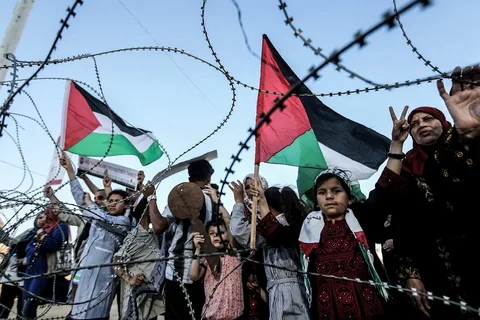Millions of Palestinians’ lives are significantly impacted by the continuous conflict, making the humanitarian situation in Palestine a topic of global concern. Severe travel restrictions, difficult economic conditions, poor access to essential services, and rampant human rights abuses are characteristics of this crisis. Frequent military operations, sporadic increases in violence, and the psychological toll on the populace—especially on children—all serve to worsen the situation.
A thorough understanding of this dilemma necessitates delving deeply into Palestinians’ everyday struggles and the political and historical backdrop that gave rise to the current state of affairs. The international community’s participation in both escalating and trying to resolve the crisis creates an additional degree of complexity, underscoring the pressing need for an all-encompassing and compassionate strategy to alleviate suffering and work toward a just and sustainable peace.
Context of History
The creation of the state of Israel in 1948 and the ensuing Arab-Israeli wars are credited with igniting the humanitarian catastrophe in Palestine in the early 20th century. Thousands of Palestinians were forced to flee their homes as a result of the conflict, and this group of refugees has remained for many decades. The situation was made worse by Israel’s control of the West Bank, Gaza Strip, and East Jerusalem following the 1967 Six-Day War.
Existence While Working
For Palestinians, living under Israeli rule has been fraught with many difficulties and hardships. The separation wall, roadblocks, and military checkpoints in the West Bank significantly impede the flow of people and products. These limitations cause disruptions to day-to-day living and make it challenging for Palestinians to get jobs, healthcare, and educational opportunities. The issue has become more complex due to the encroachment of Israeli settlements on Palestinian land and resources in the West Bank, which is prohibited by international law.
The Blockade of Gaza
Over two million Palestinians live in the Gaza Strip, which has been under Israeli embargo since 2007. A serious humanitarian crisis has resulted from this blockade, which was put in place when Hamas seized control of Gaza. Due to the blockade, it is difficult for people and products to enter or exit Gaza, which causes shortages of necessities, including fuel, food, and medication. Gaza’s economy is in complete disarray, with significant unemployment and pervasive poverty. The regular military actions and hostilities in Gaza have caused serious casualties, infrastructure damage, and psychological distress for the local populace.
Violations of Human Rights
Several transgressions of international law have been reported by human rights organizations in the occupied Palestinian territories. These transgressions include the confiscation of Palestinian land, arbitrary arrests and detentions, demolitions of homes, and the excessive use of force by Israeli security forces. It is especially alarming how Palestinian youngsters are treated; a large number of them are imprisoned and made to endure cruel interrogation techniques. The lack of accountability for these acts has sustained the cycle of violence and impunity.
Obtaining Basic Services
In the occupied Palestinian areas, there are significant restrictions on access to essential services like clean water, healthcare, and education. Owing to the blockade and ongoing fighting, Gaza’s healthcare system is in danger of collapsing. When there are shortages of electricity and medical supplies, hospitals find it difficult to offer proper care. Medical facilities are difficult to reach in the West Bank due to military checkpoints and the separation wall, especially for individuals who live in remote regions.
With numerous schools in Gaza and the West Bank being destroyed or severely damaged by military operations, education is also impacted by the conflict. Palestinian children’s capacity to learn and develop has also been negatively impacted psychologically by living in a conflict area.
Financial Difficulties
The occupied Palestinian lands are in a terrible economic state. Movement and resource access constraints have impeded economic development and progress. Gaza has one of the highest rates of unemployment in the world, and young people are disproportionately affected. Food insecurity and widespread poverty are the results of a lack of employment options. The West Bank’s military zones and settlements have divided the region, making it more difficult to do business, especially in trade and agriculture.
Foreign Assistance and Assistance
Notwithstanding the difficulties, foreign assistance and support are vital in easing some of the suffering experienced by Palestinians. Humanitarian organizations offer essential services such as healthcare, education support, and food help. However, logistical and political challenges frequently hampered the efficient distribution of help. A fair and long-lasting resolution to the war depends on addressing the underlying causes of the humanitarian crisis through international campaigning and diplomacy.
Resilient Voices
The Palestinian people’s fortitude and courage are apparent in the face of adversity. Narratives of people and societies that persistently endeavor towards an improved future despite adversity bear witness to their resilient nature. Palestinians are still standing up for their identity and demand independence and dignity, whether through grassroots projects offering healthcare and education or through artistic and cultural manifestations of resistance.
Conclusion
A thorough grasp of the historical, political, and social aspects of Palestine’s humanitarian problem is necessary because of its complexity and diversity. Palestinians’ lives have been severely impacted by the ongoing conflict and occupation, resulting in much suffering and adversity. The international community must act in unison to protect human rights, ensure humanitarian relief is delivered, and strive for a peaceful settlement of the conflict to address this crisis. We must pay attention to and elevate the voices of those most impacted by this crisis as we work to comprehend and address it. We also need to work toward a future where everyone can live in peace, justice, and dignity.

